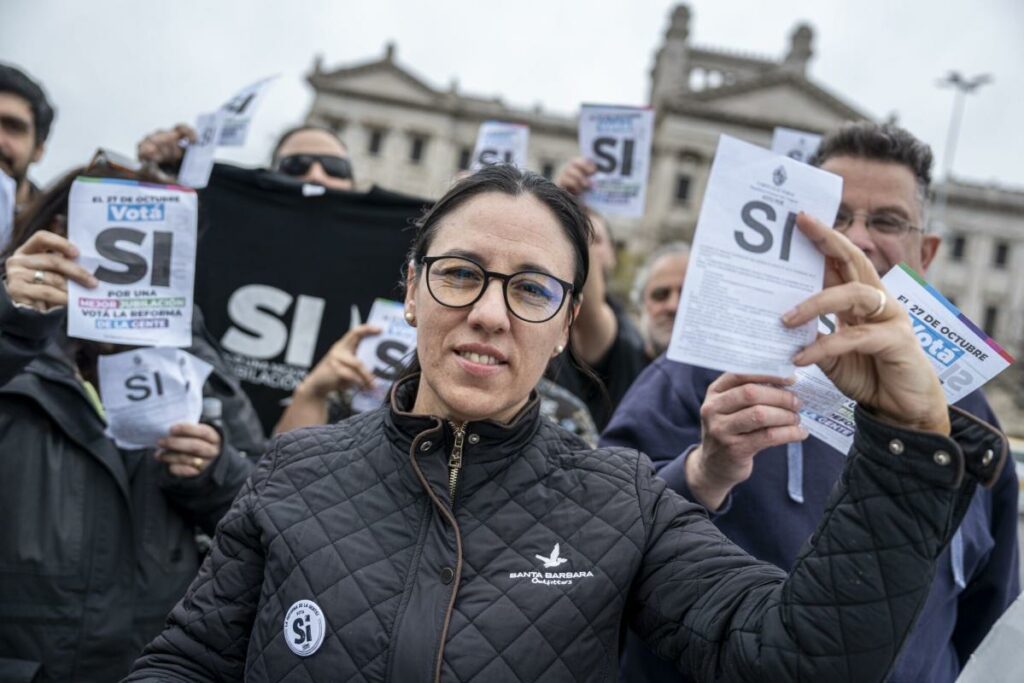(Bloomberg) — In Latin America’s haven for the rich, Uruguayans are about to decide whether to overhaul their social security system in a controversial $23 billion proposal that’s overshadowing the upcoming presidential election.
Most Read from Bloomberg
Voters will also select new legislators when they head to the polls Oct. 27, but it’s the push to enshrine major pension changes in the constitution that has captured the attention of everyday citizens and international markets. If approved by a majority, the measure would increase minimum payouts, lower the retirement age and transfer privately managed savings to a government-run trust.
Advocates view the plan as a way to share Uruguay’s resources more equally and justly. Opponents, including current President Luis Lacalle Pou and both of the leading candidates to succeed him, warn of the fiscal consequences. Market jitters over the vote triggered a selloff in some of the South American nation’s international bonds last month, while Uruguay’s peso notched its worst performance in a year with a 3% slide against the US dollar.
The country of 3.4 million is known as an island of serenity in tumultuous Latin America, thanks in part to stable governance. Google chose Uruguay this year to host a massive data center and foreign billionaires keep second homes in Montevideo and Punta del Este. But even though the proposal will immediately benefit older people with low pensions, it’s striking a chord with young voters in a nation that generally outscores its neighbors on income equality.
“How can it not be a just cause to increase just a little bit the pensions of those who built the country with their labor?” said Mauricio Vario, 33, who works at his family’s fruit and produce stand in Montevideo. He supports the measure because he agrees that no pension should be less than the minimum wage, currently 22,268 pesos ($537) a month.
The initiative, known technically as a plebiscite and backed by a powerful labor confederation and social organizations, seeks to dismantle the system created in 1995 where retirement savings managed by pension funds complement social security payouts. It would increase a typical minimum monthly pension of 18,840 pesos by nearly 20%.
“It’s dangerous and harmful. Taxes will have to be increased and important state benefits will also have to be cut” if it passes, Lacalle Pou said in an Oct. 1 televised address.
If approved, Uruguayan pension funds known as Afaps that manage retirement savings on behalf of 1.6 million workers would have two years to cease operations. Their elimination would likely have a chilling effect on local capital markets, where they are the main buyers of government and corporate debt. The construction industry has warned that an affirmative vote could jeopardize infrastructure funding.
Republica Afap and the trade group representing the other three funds — Afap Itau, Afap Sura and Integracion Afap — declined to comment.
Most polls show the measure falling short of the absolute majority of votes it needs to pass, although as many as 30% of voters remain undecided. But union leader Karina Sosa casts it as an act of social justice and self-defense against future attempts to raise the retirement age. Unions plan to distribute 3.5 million ballots and mobilize as many as 3,500 volunteers to hand them out near voting stations on election day, she said.
“The plebiscite is the people’s indignant response to a system that only works for the most powerful,” Sosa said. “What do we want to achieve? A more egalitarian society where social security is a wealth redistribution mechanism.”
Backers of the proposal are tapping discontent with Lacalle Pou’s pension reform, which gradually lifts the retirement age to 65 from 60 and grants a larger role to private savings.
The leading presidential candidate, Yamandu Orsi of the left-wing Broad Front, opposes the pension measure though his party has abstained from adopting a formal position. His main rival, Alvaro Delgado from the incumbent center-right coalition, has warned of “economic collapse” if it’s approved.
Voting in general elections is obligatory, but the plebiscite is voluntary. Uruguayans will vote for lists of presidential and congressional candidates, while plebiscite supporters must cast a separate “yes” ballot. The main political parties are refusing to include the ballot with the lists they distribute ahead of the vote and that means many people will have to proactively grab a ballot at their polling station, said Rafael Porzecanski, director of polling firm Opcion Consultores.
“That reduces the chances of the plebiscite getting approved,” he said. The labor confederation “can mobilize people, but not all of the plebiscites it supported managed to pass.”
Nevertheless, Uruguay could join others in Latin America that have jettisoned or pared back pension systems based on individual savings accounts. Argentina nationalized its pension companies in 2008, while Chile and Peru allowed savers to withdraw billions of dollars in retirement savings.
Claudia Calich, who manages about $5.5 billion as head of emerging market debt at M&G Investments, thinks financial market volatility stemming from the pension vote would be manageable. The firm has an overweight rating on Uruguay’s local currency international bonds.
“The plebiscite if approved would be a fiscal setback for the country. But it would probably take several other policy mistakes to see the Uruguay story unraveling,” Calich said in reference to the country’s reputation as a stable borrower.
Most Read from Bloomberg Businessweek
©2024 Bloomberg L.P.
Source link : http://www.bing.com/news/apiclick.aspx?ref=FexRss&aid=&tid=670fe4aaf6b84f51a93c855f9471d38f&url=https%3A%2F%2Fwww.yahoo.com%2Fnews%2F23-billion-pension-vote-overshadowing-120000489.html&c=5740657580737161411&mkt=en-us
Author :
Publish date : 2024-10-16 04:53:00
Copyright for syndicated content belongs to the linked Source.
